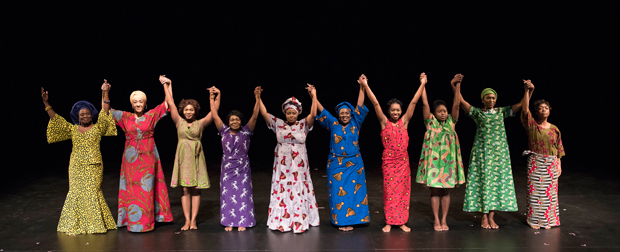Under the Radar 2019: Hear Word! Naija Woman Talk True
Ifeoma Fafunwa’s collage of female inequality in Nigeria makes its way to the Public Theater.

(© Gretjen Helene)
If nothing else, Hear Word! Naija Woman Talk True, which arrives at the Public Theater's Under the Radar Festival after successful runs in Boston and Lagos, Nigeria, is certainly striking in its timeliness. Borrowing the vignette-like structure of The Vagina Monologues and For Colored Girls…, the show, written and directed by Ifeoma Fafunwa, features 10 Nigerian female actors recounting various tales of life as women in Nigeria's patriarchal society. Ranging from horrifying narratives of rape and ostracism to more uplifting episodes of empowerment, Hear Word! will obviously resonate in the ongoing broader reckoning against toxic male behavior inspired by the #MeToo movement, and Fafunwa unapologetically encourages these associations with some of the show's more overtly rousing activist gestures.
Thankfully, there's more to Hear Word! than mere topical relevance. Through these testimonials, Fafunwa and her cast offer a clear-eyed cross-sectional analysis of societal oppression. Though men bear the brunt of the responsibility for the sexism that keeps women down, the show isn't afraid to occasionally implicate other women in their own troubles, with patriarchal ways of thinking so deeply ingrained in their minds that they can't always think past the limitations they grew up accepting without question. And while much of the show's somewhat repetitive and one-note first half abounds in heartbreaking anecdotes of women either being harassed or worse, the second half offers some heartening episodes of women finding their own ways to fight the status quo, whether visibly or covertly.
Dance numbers occur in between these scenes, with percussionists Emeka Anokwuru and Blessing Idireri providing lively musical accompaniment. More than just offering momentary respites from the often downbeat nature of the stories these performers tell, these brief sequences suggest the power of art as a tool for catharsis, a way for these women to express the kind of emotions that they aren't always allowed to articulate in public. In fact, Hear Word! as a whole can be seen as a jubilant act of artistic exorcism, with the 10-member cast all daring to stare straight into the face of the patriarchal society in which they find themselves trapped and say "no" in thunder.








